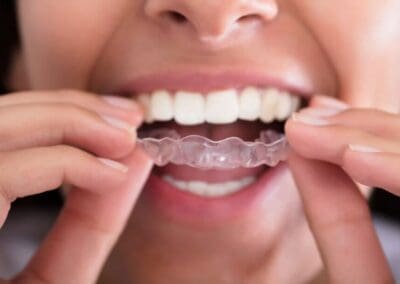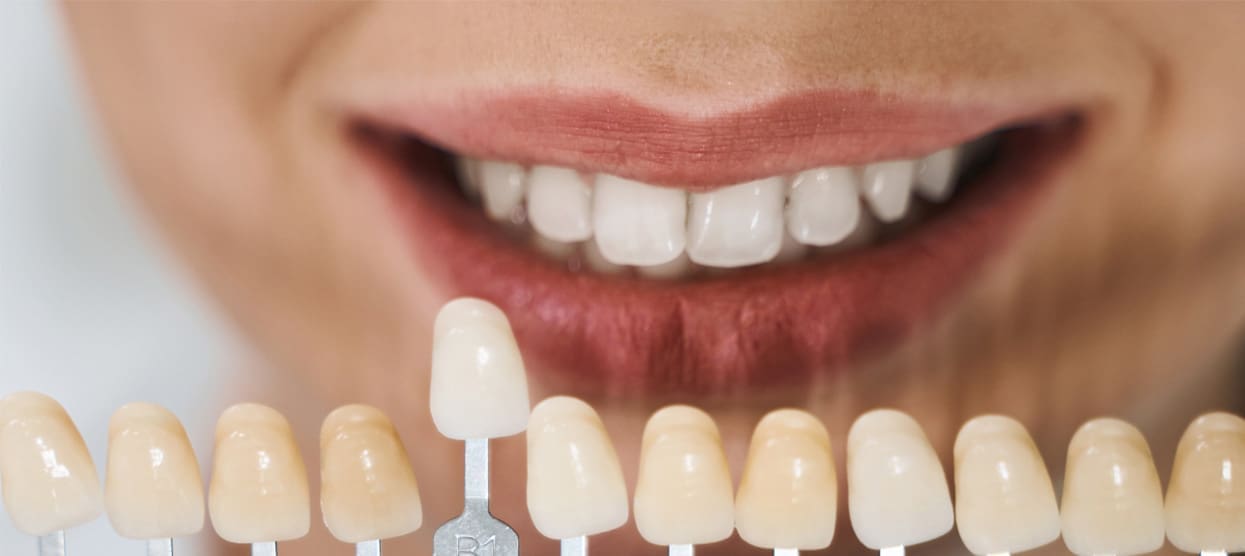
RESTORATIVE DENTISTRY
Restorative dentistry is the term we use when we talk about addressing the issues you may have with missing or damaged teeth.
When you undergo a dental exam or cleaning, our dentist and hygienists will be alert for various dental issues.
If they detect damage—or if you have any missing teeth—they’ll recommend a plan of action.
Your treatment plan may include one or more of the following:
- Crowns fit over your tooth to help restore its appearance and function.
- Bridges use a combination of crowns and false teeth to fill the gap left by a missing tooth.
- Dentures are a removable, custom-fitted appliance that replaces some or all of your missing teeth.
- Dental Implants serve as the foundation for your replacement teeth.
- Non-Surgical or Surgical Gum Treatment Non-Surgical or Surgical Gum Treatment addresses the buildup of plaque and tartar that causes gum disease.
- Root Canals are designed to rescue badly decayed or infected teeth.
If you’re concerned about your teeth’ health, function, or appearance, schedule an appointment with Dr. Andrea Giraldo. She’ll perform a thorough examination and develop a custom treatment plan to restore your teeth so that they look and feel great.

DENTAL BRIDGES
If you’re missing one or more teeth, we can use dental bridges to restore your mouth to its ideal condition.
What are Dental Bridges?
A dental bridge is exactly what it sounds like: a device that literally bridges the gap between two teeth.
To create a bridge, we place crowns on either side of the gap and a false tooth or teeth in between.
We use durable material to create bridges to ensure that they’ll last for a long time. Each bridge is custom-designed so that it matches your other teeth in color, size, and shape.
Why Choose Dental Bridges?
Bridges offer a wide variety of benefits, both cosmetic and medical. They can:
- Restore your smile
- Improve your ability to chew and speak adequately
- Maintain the shape of your face
- Properly distribute the forces in your bite
- Prevent your remaining teeth from drifting out of position
Schedule a consultation to discuss whether dental bridges are the ideal solution for your missing teeth.
DENTAL CROWNS
Are you suffering from a damaged tooth? Dental crowns may be the solution.
After years of use, your teeth may begin to weaken. This leaves them susceptible to oral health problems including decay, cracks, or discoloration.
Dental crowns give you back healthy-looking teeth that work the way they’re supposed to.
What Are Dental Crowns?
A dental crown is a cover or cap that is placed over your tooth by your dentist in order to restore its shape, size, strength, and appearance.
Once the crown is cemented into place, it fully encases the entire visible portion of your tooth.
Dental crowns are the perfect solution for a wide range of situations.
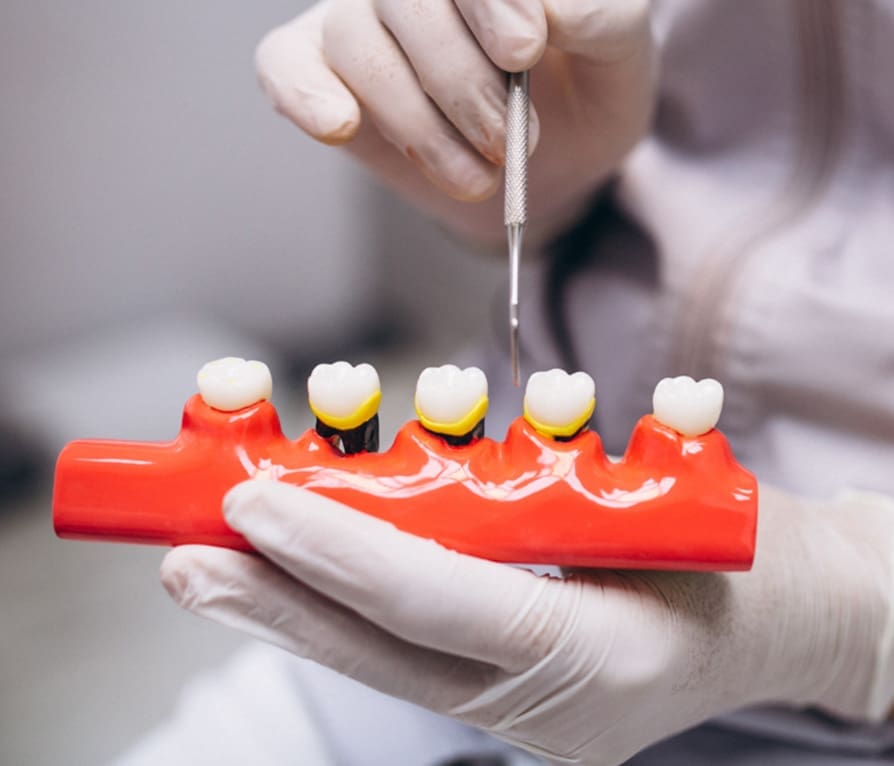
We place dental crowns to:
- Prevent a weak tooth from breaking
- Hold a cracked tooth together
- Cover and support a damaged or decayed tooth
- Cover a severely discolored tooth
- Restore a broken or severely worn tooth
When you meet with Dr. Giraldo, she’ll examine your teeth and let you know if you’re a good candidate for dental crowns.
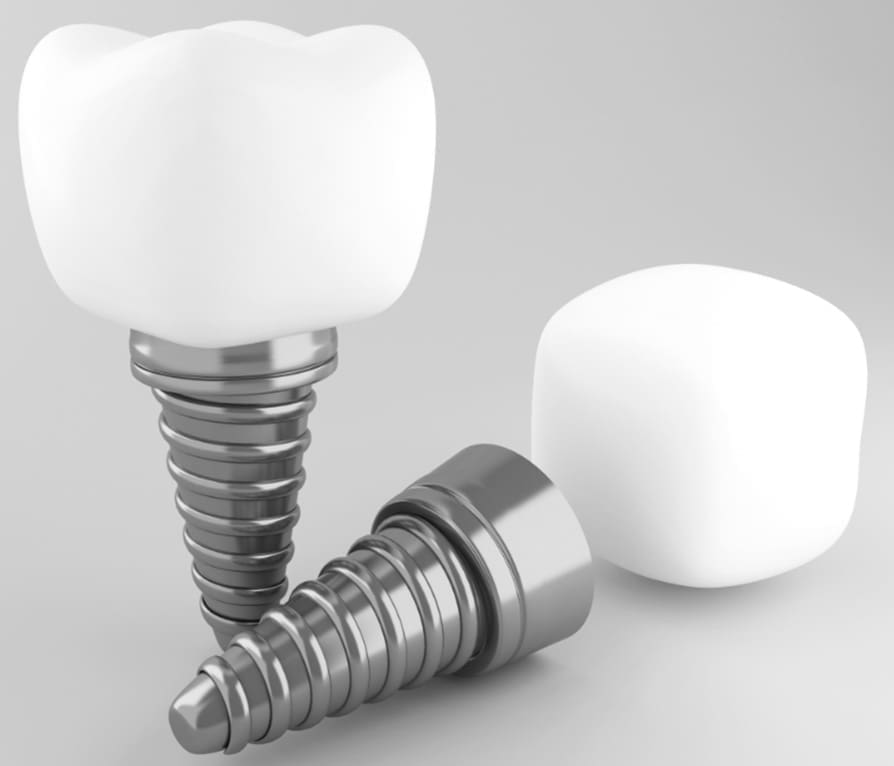
DENTAL IMPLANTS
If you are missing one or more teeth, you are not alone.
More than 178 million people in America are missing at least one tooth, and this number is expected to rise over the next 20 years.
Whether you’re missing teeth due to tooth decay, gum disease, injury, genetics, or a variety of other reasons, there is a solution.
What Are Dental Implants?
Dental implants are replacement tooth roots made of titanium. An implant provides a strong and sturdy foundation for your replacement teeth, whether you and your dentist choose crowns, bridges, or dentures
Dental implants can be used to replace a single tooth or all of your teeth.
How Do Dental Implants Work?
The first step of the implant process is to surgically insert titanium screws into your jawbone. If necessary, you may need to have damaged teeth removed before this step can take place.
Once the screws are in place, you’ll need time to heal. This allows the titanium to fuse with your jawbone, and is a process that generally takes [amount of time]. The healing process may also include a diet of soft foods, and pain medication as needed.
After your jaw has healed, you’ll return to the dentist so that she can place custom-fitted crowns or bridges depending on the number of affected teeth. Removable dentures are also an option.
Who Can Get Dental Implants?
Dental implants are suitable for patients who are missing teeth due to tooth decay, gum disease, injury, or genetics, among other reasons.
If you find wearing dentures uncomfortable, or if you don’t want to impact your healthy teeth by installing a bridge, implants may be the ideal solution.
Implants are placed surgically, so it’s important that you’re in good overall health.
Why Choose Dental Implants?
There are countless benefits to choosing dental implants to replace your missing teeth, including:
- Improved appearance
- Increased self-esteem
- Easier-to-understand speech
- Lack of discomfort
- Greater ease of eating
- Better overall oral health
If you’d like to explore getting dental implants, schedule a consultation with Dr. Giraldo to discuss how implants can restore your smile to good health.
DENTURES
Tired of Living With Missing Teeth?
If you’ve lost some—or all—of your teeth, you’re aware of the problems that can arise. Your facial muscles begin to sag. It’s hard to speak without slurring your words. Chewing is more
difficult than it used to be.
Dentures will bring your smile back by replacing your teeth and the surrounding tissues. Modern techniques and custom fitting mean that today’s dentures look better than ever before.
What Are Dentures?
Dentures are removable appliances that replace one or more missing teeth. We custom-fabricate your dentures to fit your mouth and match the appearance of your natural teeth.
Whenever you need, we can adjust the fit of your dentures to ensure they work properly and that you always feel comfortable wearing them.
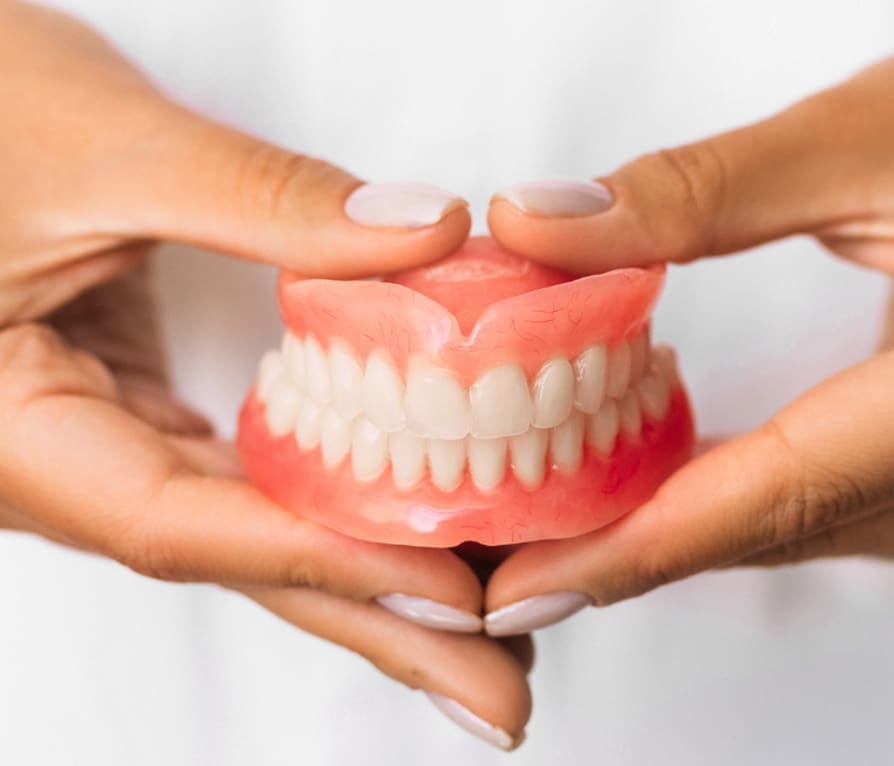
Are There Different Types of Dentures?
There are two main types of dentures, complete and partial. Complete dentures replace the full upper or lower set of teeth. Partial dentures replace one or more teeth when some of your natural teeth remain.
How Do I Care For My Dentures?
- Keep your twice-yearly dental appointments
- Clean your dentures regularly using a soft bristle toothbrush and non-abrasive cleanser.
- Store your dentures in water or a denture-soaking solution to keep their shape, and be sure to rinse them before putting them back in.
- Taking good care of your dentures will ensure they last from 5 to 10 years.
Let us help you restore your smile. Schedule a consultation with our experienced dental team to see if dentures are right for you. If you already have dentures but want to refit or replace them, we’re here to help you too. Contact our office to set up an appointment today.
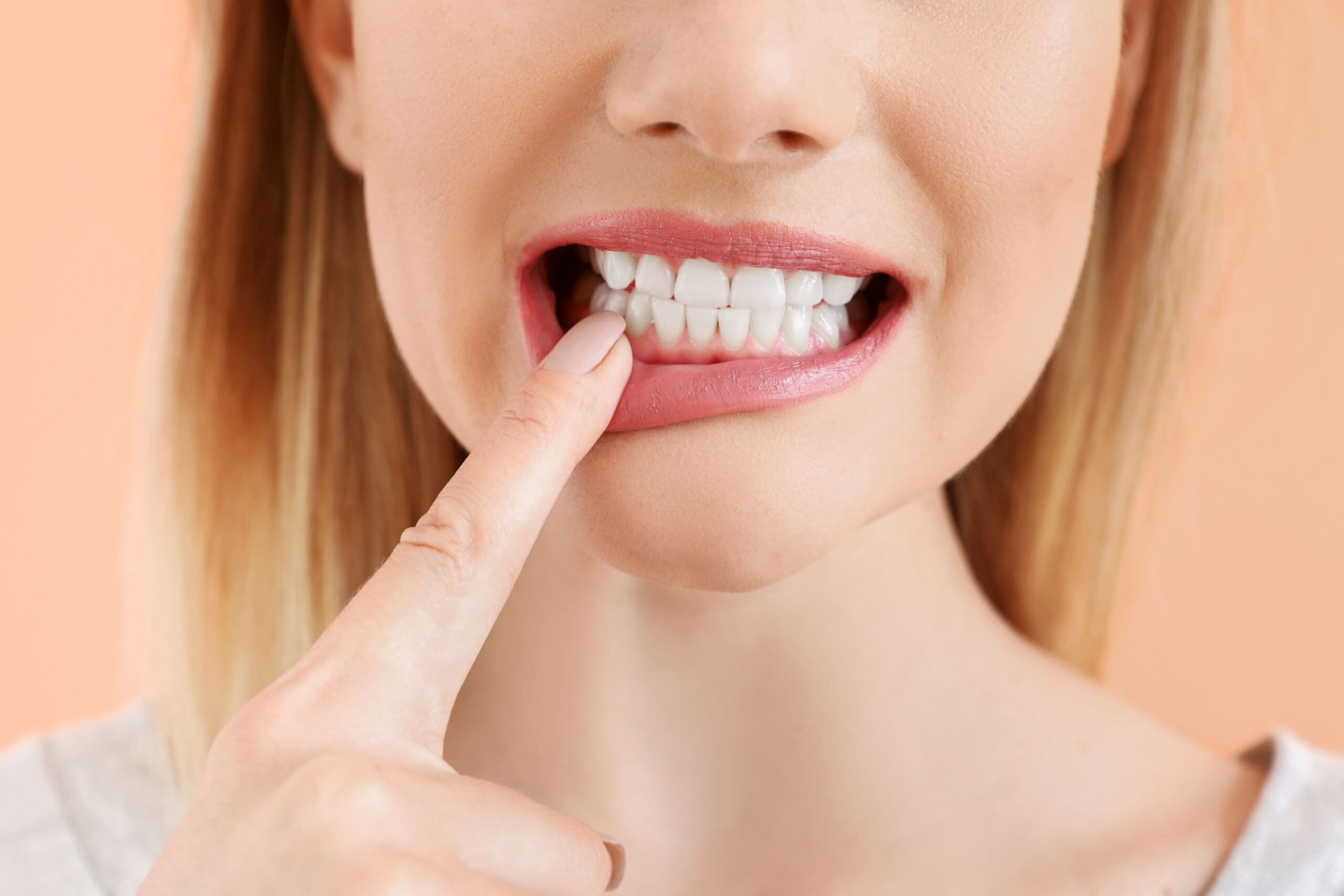
GUM DISEASE
Gum disease, also known as periodontal disease, occurs when the tissues that support your teeth become infected. It is possible to have periodontal disease and have no warning signs — in fact, gum disease is often painless.
Gum disease occurs in two stages:
The first stage is called gingivitis. Symptoms include red or swollen gums, or gums that bleed easily. The good news is that gingivitis can be treated by a professional cleaning.
The second stage is called periodontitis. It affects over 47.2% of adults over 30 in the U.S. Over time, it weakens the tissues and bones in your mouth and can lead to tooth loss.
We often think of dentistry as being just about taking care of our teeth, but the health of our gums is equally important.
What Are the Symptoms of Gum Disease?
The American Academy of Periodontology warns patients to look out for these symptoms:
- Red, swollen or tender gums or other pain in your mouth
- Bleeding while brushing, flossing, or eating hard food
- Gums that are receding or pulling away from the teeth, causing the teeth to look longer than before
- Loose or separating teeth
- Pus between your gums and teeth
- Sores in your mouth
- Persistent bad breath
- A change in the way your teeth fit together when you bite
- A change in the fit of partial dentures
What Are the Risk Factors for Gum Disease?
There are a number of factors that may make you more likely to suffer from gum disease. They include:
- Smoking
- Diabetes
- Poor oral hygiene
- Stress
- Heredity
- Crooked teeth
- Underlying immuno-deficiencies—e.g., AIDS
- Fillings that have become defective
- Taking medications that cause dry mouth
- Bridges that no longer fit properly
- Female hormonal changes, such as with pregnancy or the use of oral contraceptives
How Is Gum Disease Treated?
There are a number of factors that may make you more likely to suffer from gum disease. They include:
Non-Surgical Treatment
Our first method of non-surgical treatment is scaling and root planning. The process is simple: we remove plaque and tartar from above and below your gumline. Afterward, we smooth the root of your teeth to help your gums adhere back in place.
We’ll then schedule a follow-up appointment, where the dentist or hygienist will check to see how you’re healing.
If scaling and root planning is insufficient, we may recommend laser gum treatment. This process uses a laser to gently remove harmful bacteria and diseased tissue from the gum pocket. Laser treatment is minimally invasive, which means that it takes less time and causes less discomfort.
Laser gum treatment can be completed in two 2-hour sessions, with two follow-up appointments afterward.
Surgical Treatment
Traditional surgery requires four sessions of about one hour each, with subsequent visits for suture removal and additional check-ups.
If you’re suffering any of the symptoms mentioned above, schedule a consultation with Dr. Andrea Giraldo to help stop gum disease in its tracks.
ROOT CANALS
If you have a toothache that won’t go away, a root canal may be the best solution to save your tooth.
Read on to learn more about this oft-misunderstood treatment.
What Is a Root Canal?
A root canal repairs and saves a tooth that is badly decayed or infected.
The first step in any root canal is selecting the method of anesthesia or sedation that lets you relax and avoid feeling pain during the procedure.
During the procedure, we make an opening so that we can remove the nerve inside the tooth. Once it’s removed, we clean and seal the inside. Then we place a temporary filling to protect it until your follow-up appointment.
At the follow-up visit, we’ll place a filling or a crown on the affected tooth.
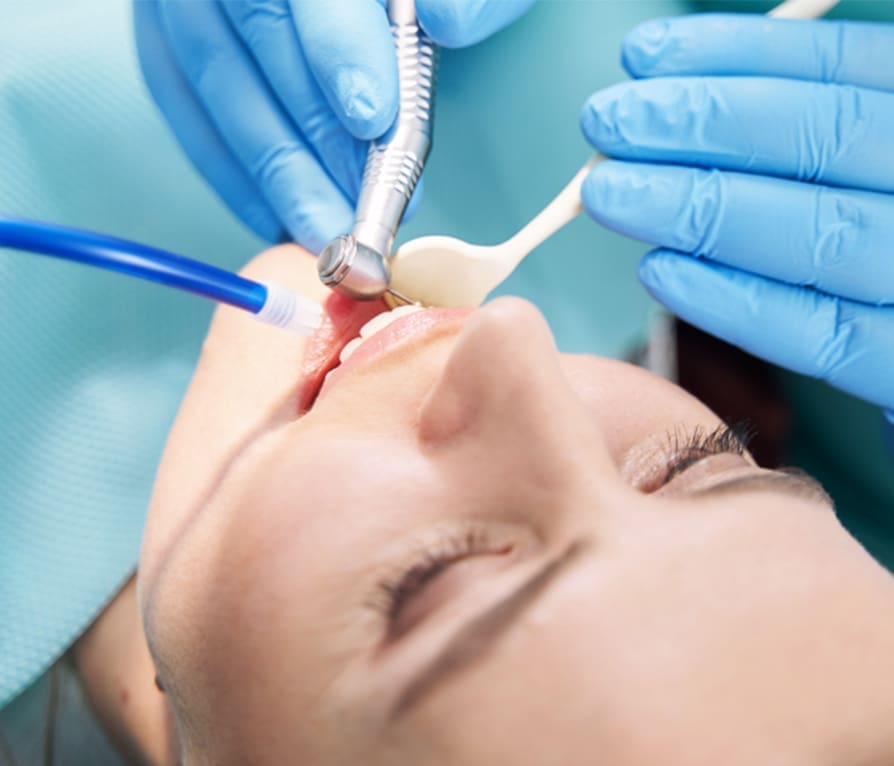
Are Root Canals Painful?
Good news! The root canal procedure is far less painful than the discomfort you’ve already experienced due to your damaged tooth.
During your root canal, local anesthesia or sedation will be provided to ensure that you feel relaxed and comfortable.
In the days after the procedure, your tooth may feel sensitive. Treatment options include over-the-counter or prescription pain medications.
We’ll work together to find the right solutions for you during and after your root canal.
Do I Need a Root Canal?
Signs and symptoms that you may need a root canal include:
- Prolonged tooth sensitivity
- Severe pain when you put pressure on your tooth
- Prominent darkening of the tooth
- Gum abscesses, swelling or tenderness
If you’re suffering any of the above symptoms, schedule a consultation with our office. Root canals often get a bad rap, but your root canal will be safe and relatively painless with Dr. Giraldo. And best of all, it will save your tooth—and your smile.


